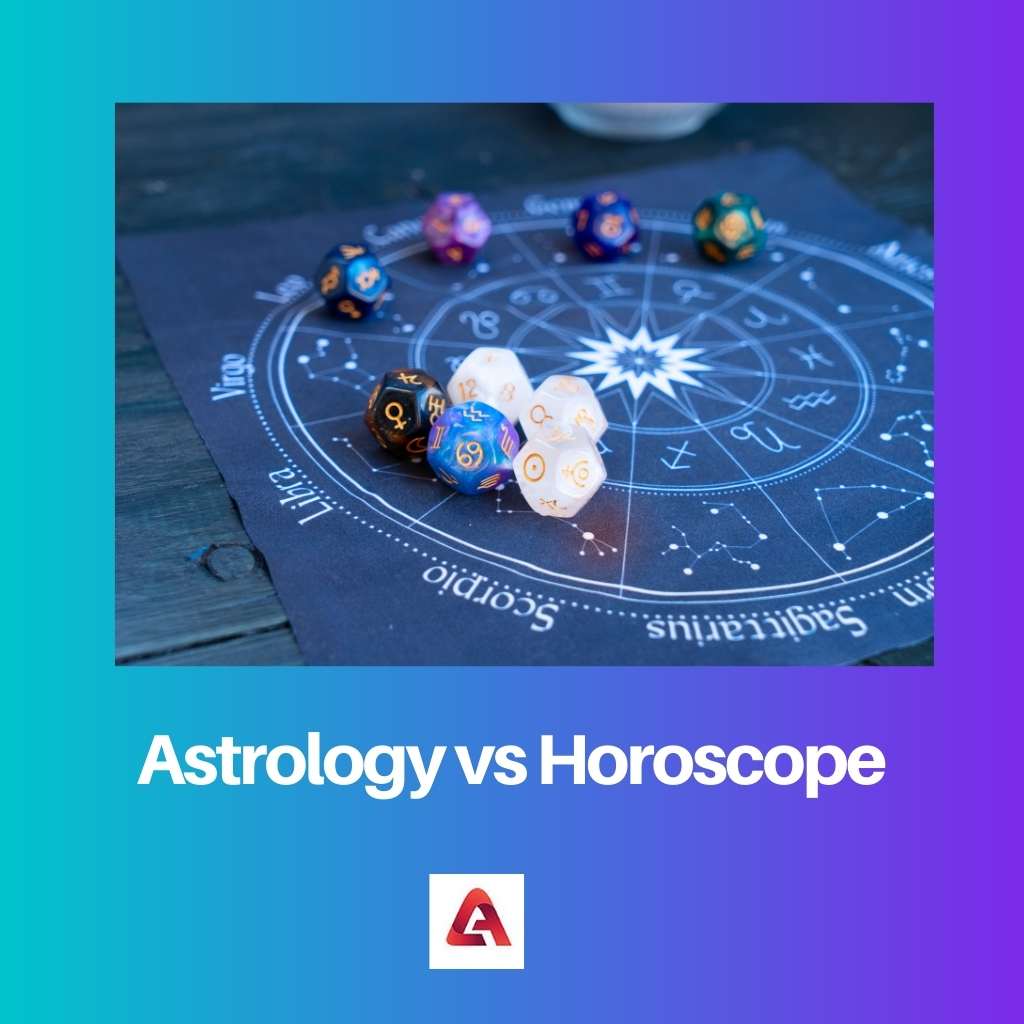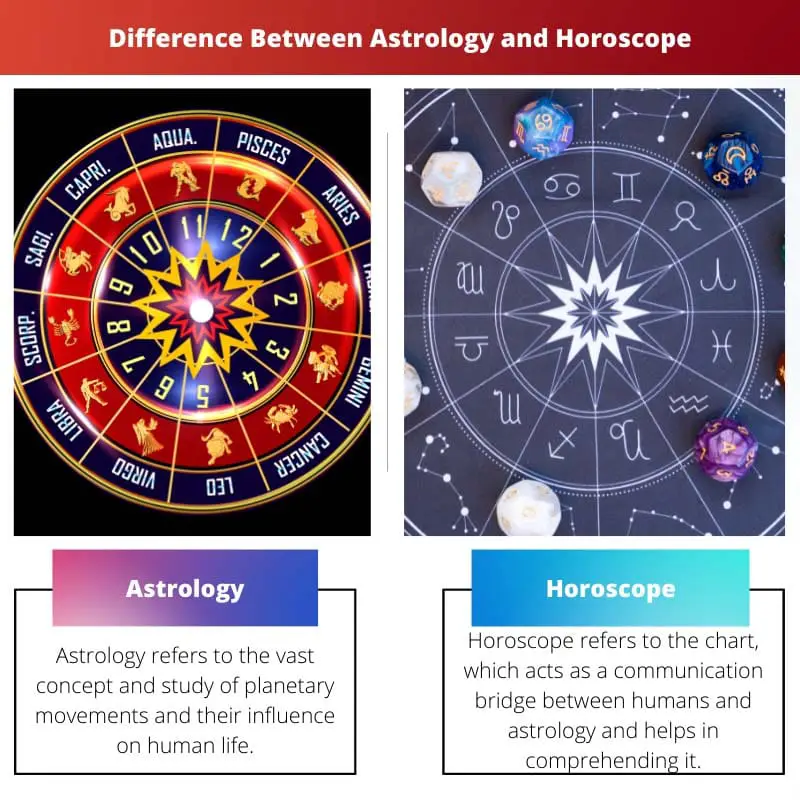It’s a common tendency of humans that they desire to know about their future. Since ancient times, the attempt to know about futuristic events has led to the discovery of astrology and horoscopes.
Years back, both these terms were fields of science. Moreover, practitioners of astrology came to be known as astrologers.
Whereas horoscopes also crawled to find a space in newspaper columns and in other public writings.
Key Takeaways
- Astrology studies celestial bodies’ influence on human affairs, while a horoscope is a specific astrological prediction or chart.
- Horoscopes are based on astrological principles and are a subset of astrology.
- Astrology encompasses various techniques and practices, whereas horoscopes provide personalized predictions based on birth data.
Astrology vs Horoscope
The difference between horoscope and astrology is that astrology serves as the method for the derivation of result, i.e., horoscope. While astrology refers to a field of study, horoscope refers to an astrological chart or prediction. Moreover, astrology dates back to 5000 years ago. Whereas, horoscopes date back to 2400 years ago.

Astrology refers to the pseudoscientific divination wherein the astrologers forecast futuristic events in human and earthly life through observations of celestial bodies.
Earlier, it continued to be a part of astrology until it couldn’t stand up to scientific grounds and proofs in favor of itself.
While astrology was declining towards the end of the 17th century, Alan Leo’s work revived and reshaped it, thereby making him the Father of Astrology.
Horoscope is an astrological forecast of an individual’s future which is carried out using his date of birth. The angles made by these celestial bodies with respect to a specific reference are used for evaluation.
The four primary angles are the first house, which is the ascendant, the tenth house, the seventh house, which is the descendant, and the fourth house.
The ascendant and the midheaven, i.e., the tenth house, form the most crucial angles.
Comparison Table
| Parameters of Comparison | Astrology | Horoscope |
|---|---|---|
| Meaning | Astrology refers to the vast concept and study of planetary movements and their influence on human life. | Horoscope refers to the chart, which acts as a communication bridge between humans and astrology and helps in comprehending it. |
| Founded in | Astrology emerged around 5000 years ago. | Horoscopes emerged around 2400 years ago. |
| Culture | Astrology comes down from the Greeks, who further had adopted it from the Romans and the Babylonians. | Horoscope comes down from the Mesopotamian civilization. |
| Depends On | Astrology depends on the movement and positions of planets and stars. | Horoscopes depend on astrology. |
| Types | The three types of astrology include Vedic, Western, and Chinese. | The seven common types of horoscopes include love horoscope, horary horoscope, natal horoscope, Vedic horoscope, medical horoscope, electional horoscope, and uranian horoscope. |
What is Astrology?
The study of movements of cosmic objects and celestial bodies such as planets and stars and their impact on earthly affairs and human life and affairs is known as astrology.
Often referred to as “pseudoscience,” astrology also deals with the relative positions of these objects.
Dating back to the 2nd millennium BCE, astrology started with a calendrical system when it was used to forecast seasonal shifts.
In the world of astrology, every celestial body has its own meaning. Moreover, the same planets and luminary objects talk of various things and characteristics in various personal astrology.
The sun symbolizes identity, self-esteem, and confidence. The moon symbolizes values, emotional safety, and intuition. Mercury symbolizes communication.
Venus influences love, relationships, money, and other pleasurable experiences. Similarly, other planets and celestial bodies point out other important human and worldly affairs aspects.
Astrology can again be categorized into three types, namely, mundane astrology, interrogatory astrology, and natal astrology.
Mundane Astrology helps in the examination of the worldly state of affairs and makes predictions regarding wars, a nation’s economic condition, and other such matters.
Interrogatory astrology is used for the analysis of the events taking place in an individual’s life.
Whereas natal astrology is based on the Law of Beginnings and is useful in knowing about an individual’s futuristic events by relating it with his date of birth.

What is Horoscope?
Horoscope refers to an astrological representation of the movements and relative positions of the moon, sun, and other celestial and astrological bodies at the moment of a particular event.
Magazines and newspapers always have horoscopes for the day, week, month, and year in a column. According to Hindu cultures, all events should be started by properly examining the individual’s horoscope.
The origin of horoscopes dates back to the time of Babylonians, who made their first horoscope much before somewhere 2,400 years ago.
As horoscopes haven’t gained scientific validity, they’re considered pseudoscience.
Western Astrology portrays twelve zodiac signs: Aries, Taurus, Gemini, Cancer, Leo, Virgo, Libra, Scorpio, Sagittarius, Capricorn Aquarius, and Pisces.
These zodiac signs represent male and female counterparts of the same character.
Moreover, these signs are also associated with the four basic survival elements, namely, fire, water, earth, and air. Aries, Sagittarius, and Leo are associated with fire.
Capricorn, Virgo, and Taurus are associated with water. Gemini, Aquarius, and Libra are associated with air. Pisces, Scorpio, and Cancer are associated with Earth.
Fire and air represent extrovert and masculine features, whereas earth and water represent introvert and feminine features. R.H. Naylor printed the first horoscope in a newspaper column.
According to Western concepts, the subject turns out to be at the center of the celestial sphere, including the projections of various planets, zodiacs, and constellations.

Main Differences Between Astrology and Horoscope
- This term astrology is derived from the Latin term “astrologia,” whereas the term horoscope is derived from the Greek term “horoskopoi.”
- The oldest surviving astrological document dates back to 1600 BC. On the other hand, the oldest surviving horoscope document dates back to the 1st century BC.
- Astrology is the gift of the Romans and the Babylonians, and it was passed by the Greeks to form modern-day astrology. But in the horoscope, a Mesopotamian civilization is the genesis of this knowledge.
- Planetary moments and locations of stars scale the astrology readings. Whereas the horoscope hinges upon the prognoses of astrology.
- Astrology is divided into subcategories like Vedic, Western and Chinese. It is a bit larger in the case of horoscopes–love horoscope, horary horoscope, natal horoscope, Vedic horoscope, medical horoscope, electional horoscope, and uranian horoscope.


The post provides an insightful analysis of the difference between astrology and horoscope.
I appreciate the thorough study and research that has gone into this analysis.
Absolutely, it’s an engaging read for those interested in the subject.
It is evident that the author has delved deep into the subject matter to present a comprehensive account of astrology and horoscopes.
The detailed explanations are highly informative and thought-provoking.
Absolutely, it’s a well-researched piece that offers valuable insights.
The post has effectively outlined the historical origins of astrology and horoscopes.
Indeed, the historical context provided adds great value to the article.
The author has effectively highlighted the key differences between astrology and horoscopes in an intellectually stimulating manner.
Absolutely, the article’s depth of analysis is truly commendable.
The analysis is insightful and provides a fascinating comparison between astrology and horoscopes.
The article’s scholarly approach to the topic makes it an enriching read.
I have thoroughly enjoyed the depth of knowledge presented in this piece.